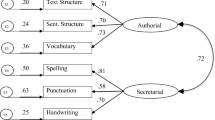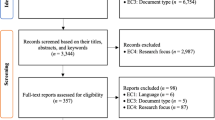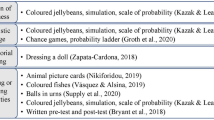Abstract
We report results from an analysis of responses to a written question in which high-attaining students in English schools, who formed part of a longitudinal nation-wide survey on proof conceptions, were asked to assess the equivalence of two statements about elementary number theory, one a logical implication and the other its converse, to evaluate the truth of the statements and to justify their conclusions. We present an overview of responses at the end of Year 8 (age 13 years) and an analysis of the approaches taken, and follow this with an analysis of the data collected from students who answered the question again in Year 9 (age 14 years) in order to distinguish learning trajectories. From these analyses, we distinguished three strategies, empirical, focussed-empirical and focussed-deductive, that represent shifts in attention from an inductive to a deductive approach. We noted some progress from Year 8 to Year 9 in the use of the focussed strategies but this was modest at best. The most marked progress was in recognition of the logical necessity of a conclusion of an implication when the antecedent was assumed to be true. Finally we present some theoretical categories to capture different types of meanings students assign to logical implication and the rationale underpinning these meanings. The categories distinguish responses where a statement of logical implication is (or is not)interpreted as equivalent to its converse, where the antecedent and consequent are (or are not) seen as interchangeable, and where conclusions are (or are not)influenced by specific data.
Similar content being viewed by others
REFERENCES
Anderson, R.C., Chinn, C., Chang, J., Waggoner, M. and Yi, H.: 1997, ‘On the logical integrity of children's arguments’, Cognition and Instruction 15(2), 135–167.
Balacheff, N.: 1988, ‘Aspects of proof in pupils’ practice of school mathematics’, in D. Pimm (ed.), Mathematics, Teachers and Children, Hodder and Stoughton, London, pp. 216–235.
Bell, A.W.: 1976, ‘A study of pupils’ proof-explanations in mathematical situations’, Educational Studies in Mathematics 7, 23–40.
Ceci, Stephen J.: 1990, On Intelligence - More or Less. A Bio-Ecological Treatise of Intellectual Development, Century Psychology Series, Prentice Hall, USA.
Cheng, P.W. and Holyoak, K.J.: 1985, ‘Pragmatic reasoning schemas’, Cognitive Psychology 17, 391–416.
Coe, R. and Ruthven, K.: 1994, ‘Proof practices and constructs of advanced mathematics students’, British Educational Research Journal 20(1), 41–53.
Deloustal-Jorrand, V.: 2002, ‘Implication and mathematical reasoning’, Proceedings of the 26th Conference of the International Group for the Psychology of Mathematics Education 26(2), Norwich, England, pp. 281–288.
De Villiers, M.: 1990, ‘The role and function of proof in mathematics’, Pythagoras 24, 17–24.
Fischbein, E.: 1982, ‘Intuition and proof’, For the Learning of Mathematics 3(2), 9–18, 24.
Godino, J.D. and Recio, A.M.: 1997, ‘Meaning of proofs in mathematics education’, Proceedings of the 21st Conference of the International Group for the Psychology of Mathematics Education, 2, Lahti, Finland, pp. 313–320.
Hanna, G.: 1989, ‘Proofs that prove and proofs that explain’, Proceedings of the 13th Conference of the International Group for the Psychology of Mathematics Education, G.R. Didactique CNRS Paris, pp. 45–51.
Hanna, G.: 1995, ‘Challenges to the importance of proof’, For the Learning of Mathematics 15(3), 42–49.
Hanna, G.: 2000, ‘Proof, explanation and exploration: an overview’, Educational Studies in Mathematics 44, 5–23.
Healy, L. and Hoyles, C.: 2000, ‘A study of proof conceptions in algebra’, Journal for Research in Mathematics Education 31(4), 396–428.
Hewitt, D.: 1992, ‘Train spotters’ paradise’, Mathematics Teaching 140, 6–8.
Hoyles, C.: 1997, ‘The curricular shaping of students’ approaches to proof’, For the Learning of Mathematics 17(1), 7–16.
Inhelder, B. and Piaget, J.: 1958, The Growth of Logical Thinking, Routledge and Kegan Paul, London.
Krummheuer, G.: 1995, ‘The ethnology of argumentation’, in P. Cobb and H. Bauersfeld (eds.), The Emergence of Mathematical Meaning: Interaction in Classroom Cultures, Erlbaum, Hillsdale, NJ, pp. 229–269.
Mitchell, D.: 1962, An Introduction to Logic, Hutchinson, London.
O'Brien, T.C., Shapiro, B.J. and Reali, N.C.: 1971, ‘Logical thinking - language and context’, Educational Studies in Mathematics 4, 201–219.
Quine, W.V.: 1974, Methods of Logic, (Third edition; first edition published in 1950) Routledge & Kegan Paul, London.
Reid, D.A.: 2002, ‘Conjectures and refutations in Grade 5 mathematics’, Journal for Research in Mathematics Education 33(1), 5–29.
Rodd, M.: 2000, ‘On mathematical warrants’, Mathematical Thinking and Learning 3, 22–244.
Simon, M.A.: 2000, ‘Reconsidering mathematical validation in the classroom’, Proceedings of the 24th Conference of the International Group for the Psychology of Mathematics Education 4, Hiroshima, Japan, pp. 161–168.
Sowder, L. and Harel, G.: 1998, ‘Types of students’ justifications’, The Mathematics Teacher 91(8), 670–675.
Toulmin, S.: 1958, The Uses of Argument, Cambridge University Press, Cambridge, UK.
Van Dormolen, J.: 1977, ‘Learning to understand what a proof really means’, Educational Studies in Mathematics 8, 27–34.
Vinner, S.: 1983, ‘The notion of proof - some aspects of students’ views at the senior high school level’, Proceedings of the 7th Conference of the International Group for the Psychology of Mathematics Education, pp. 289–294.
Wason, P.C.: 1960, ‘On the failure to eliminate hypotheses in a conceptual task’, Quarterly Journal of Experimental Psychology 12, 129–140.
Wason, P.C. and Shapiro, D.: 1971, ‘Natural and contrived experience in a reasoning task’, Quarterly Journal of Experimental Psychology 23, 63–71.
Yackel, E.: 2001, ‘Explanation, justification and argumentation in mathematics classrooms’, Proceedings of the 25th Conference of the International Group for the Psychology of Mathematics Education, 1, Freudenthal Institute, Utrecht, Holland, pp. 9–23.
Yackel, E. and Cobb, P.: 1996, ‘Sociomathematical norms, argumentation, and autonomy in mathematics’, Journal for Research in Mathematics Education 27, 458–477.
Zack, V. and Graves, B.: 2001, ‘Making mathematical meaning through dialogue: “Once you think of it, the Z minus three seems pretty weird”’, Educational Studies in Mathematics 46(1-3), 229–271.
Author information
Authors and Affiliations
Rights and permissions
About this article
Cite this article
Hoyles, C., Küchemann, D. Students' understandings of logical implication. Educational Studies in Mathematics 51, 193–223 (2002). https://doi.org/10.1023/A:1023629608614
Issue Date:
DOI: https://doi.org/10.1023/A:1023629608614




